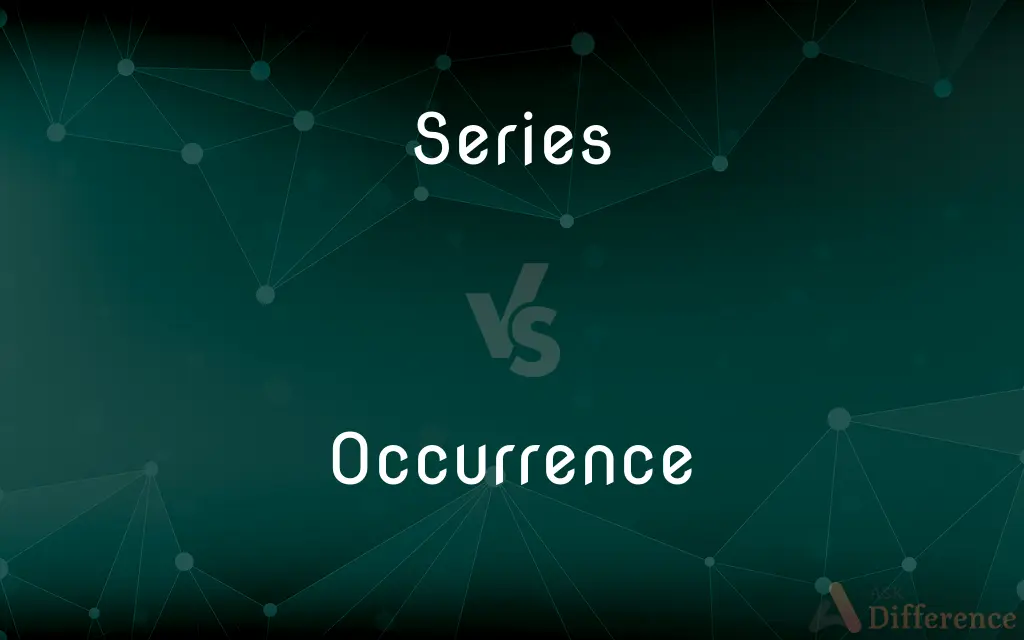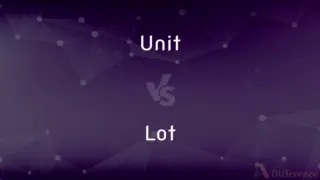Series vs. Occurrence — What's the Difference?
By Tayyaba Rehman — Updated on November 7, 2023
Series is a sequence of events or things, whereas an occurrence is a single event or instance.

Difference Between Series and Occurrence
Table of Contents
ADVERTISEMENT
Key Differences
A series refers to a number of similar or related events or things, one following the other. It implies a continuation or sequence in time or a related chain of events or items. On the other hand, an occurrence is an event or something that happens, typically considered in isolation or as a unique instance. While a series is ongoing, an occurrence is a standalone event.
In a series, there is an implication of relation or connectivity between the events or things that form it. It suggests a pattern or a regular sequence that is identifiable. In contrast, an occurrence does not imply a pattern but is simply an event that takes place, possibly without any connection to other events. Series denotes continuation, whereas occurrence denotes a singular point in time.
The term series can also imply a planned or intended sequence, like a series of books or television episodes, which are created with a certain order in mind. Occurrence doesn't carry this implication; it is often used to describe events that happen, sometimes unexpectedly, without any planning or specific order.
When discussing television, a series is a set of episodes that follow a narrative or are linked by the same subject. However, within that series, each airing of an episode is an occurrence. This highlights how a series is made up of multiple occurrences, which can be identified individually.
A series is often something one can follow or collect, like a series of stamps, where the collector anticipates adding to the sequence over time. An occurrence, such as seeing a rare bird while hiking, is not something one collects but something one experiences unexpectedly.
ADVERTISEMENT
Comparison Chart
Definition
A sequence or set of related events/items
A single event or instance
Temporal Nature
Continuous or recurring
Singular or random
Connectivity
Elements are related
Elements are independent
Planning
Often pre-planned or structured
Usually spontaneous or unforeseen
Example in Media
A television series with multiple seasons
A special news report on an unexpected event
Compare with Definitions
Series
A set of similar things coming one after another.
The Harry Potter book series captivated readers worldwide.
Occurrence
An incident or event that happens unexpectedly.
A power outage was a rare occurrence in the well-maintained city.
Series
A set of broadcast programs following a particular theme or storyline.
The new detective series airs on Thursday nights.
Occurrence
A phenomenon that is observed to happen.
Solar eclipses are an occurrence that attracts many astronomers.
Series
A number of objects or events arranged or coming one after the other in succession.
Occurrence
An event of a particular type or category.
Crime is an unfortunate occurrence in urban areas.
Series
A set of stamps, coins, or currency issued in a particular period.
Occurrence
An instance of something occurring in a particular place.
The occurrence of gold in this mine led to a gold rush.
Series
Physics & Chemistry A group of objects related by linearly varying successive differences in form or configuration
A radioactive decay series.
The paraffin alkane series.
Occurrence
The fact of something happening or taking place.
The occurrence of the comet can be seen every 76 years.
Series
(Mathematics) The sum of a sequentially ordered finite or infinite set of terms.
Occurrence
The action, fact, or instance of occurring
The occurrence of snow is rare in these parts.
Series
(Geology) A group of rock formations closely related in time of origin and distinct as a group from other formations.
Occurrence
Something that takes place; an event or incident
Worrisome occurrences.
Series
(Grammar) A succession of coordinate elements in a sentence.
Occurrence
An actual instance when a situation occurs; an event or happening.
Series
A succession of publications that present an extended narrative, such as a comic book series, or that have similar subjects or similar formats, such as a series of cookbooks.
Occurrence
The lexical aspect (aktionsart) of verbs or predicates that change in or over time.
Series
A succession of individual programs presented as parts of a unified whole, such as the set of episodes of a television show or a podcast.
Occurrence
A coming or happening; as, the occurence of a railway collision.
Voyages detain the mind by the perpetual occurrence and expectation of something new.
Series
(Sports) A number of games played by the same two teams, often in succession.
Occurrence
Any event or incident; esp., one which happens without being designed or expected; as, an unusual occurrence, or the ordinary occurrences of life.
All the occurrence of my fortune.
Series
(Baseball) The World Series.
Occurrence
An event that happens
Series
(Linguistics) A set of vowels or diphthongs related by ablaut, as in sing, sang, sung, and song.
Occurrence
An instance of something occurring;
A disease of frequent occurrence
The occurrence (or presence) of life on other planets
Series
A number of things that follow on one after the other or are connected one after the other.
A series of seemingly inconsequential events led cumulatively to the fall of the company.
Series
(broadcasting) A television or radio program which consists of several episodes that are broadcast in regular intervals
“Friends” was one of the most successful television series in recent years.
Series
(mathematics) The sequence of partial sums of a given sequence ai.
The harmonic series has been much studied.
Series
A group of matches between two sides, with the aim being to win more matches than the opposition.
The Blue Jays are playing the Yankees in a four-game series.
Series
(zoology) An unranked taxon.
Series
(botany) A subdivision of a genus, a taxonomic rank below that of section (and subsection) but above that of species.
Series
(commerce) A parcel of rough diamonds of assorted qualities.
Series
(phonology) A set of consonants that share a particular phonetic or phonological feature.
Series
(electronics) Connected one after the other in a circuit, in series.
You have to connect the lights in series for them to work properly.
Series
A number of things or events standing or succeeding in order, and connected by a like relation; sequence; order; course; a succession of things; as, a continuous series of calamitous events.
During some years his life a series of triumphs.
Series
Any comprehensive group of animals or plants including several subordinate related groups.
Series
In Engler's system of plant classification, a group of families showing certain structural or morphological relationships. It corresponds to the cohort of some writers, and to the order of many modern systematists.
Series
An indefinite number of terms succeeding one another, each of which is derived from one or more of the preceding by a fixed law, called the law of the series; as, an arithmetical series; a geometrical series.
Series
A mode of arranging the separate parts of a circuit by connecting them successively end to end to form a single path for the current; - opposed to parallel. The parts so arranged are said to be in series.
Series
A parcel of rough diamonds of assorted qualities.
Series
Similar things placed in order or happening one after another;
They were investigating a series of bank robberies
Series
A serialized set of programs;
A comedy series
The Masterworks concert series
Series
A periodical that appears at scheduled times
Series
(sports) several contests played successively by the same teams;
The visiting team swept the series
Series
A group of postage stamps having a common theme or a group of coins or currency selected as a group for study or collection;
The Post Office issued a series commemorating famous American entertainers
His coin collection included the complete series of Indian-head pennies
Series
(mathematics) the sum of a finite or infinite sequence of expressions
Series
(electronics) connection of components in such a manner that current flows first through one and then through the other;
The voltage divider consisted of a series of fixed resistors
Series
A number of events of a similar kind, especially when sequential.
The team's winning series boosted their morale.
Series
A sequence of competitive games or matches.
The baseball series between the two rival teams was intense.
Series
An arrangement or succession of things.
She arranged the photographs in a series along the hallway.
Common Curiosities
Is a movie sequel considered a series?
Yes, movie sequels are often considered part of a series.
Can occurrences be predicted?
Some occurrences can be predicted if they follow a pattern, but many are random.
Can an occurrence be part of a series?
Yes, an occurrence can be part of a series if it is one of the related events.
Can a series exist with only two items?
Yes, a series can exist with just two related items or events.
Are series always chronological?
Most series are chronological, but some may explore non-linear storytelling.
What does it mean when an occurrence is described as 'frequent'?
It means the event happens often.
What is a series in literature?
A series in literature is a group of books related by characters, settings, or themes.
How is a series in mathematics defined?
In mathematics, a series is the sum of the terms of a sequence.
How does an occurrence differ from an accident?
An occurrence is any event that happens, while an accident is an unexpected and undesirable event.
Is a sports tournament considered a series?
Yes, a sports tournament can be considered a series of related games.
Does an occurrence always have a cause?
Most occurrences have causes, though they may not always be apparent.
Can a series be unplanned?
While series usually follow a plan, an unplanned series can emerge from a pattern of occurrences.
Is a documentary a series?
A documentary can be a series if it has multiple parts or episodes.
What distinguishes a recurring occurrence from a series?
A recurring occurrence is a single type of event that happens repeatedly, while a series is a group of related events.
How are series and occurrence used in statistics?
In statistics, a series refers to data points in time order, while an occurrence is any event that can be counted or measured.
Share Your Discovery

Previous Comparison
Variant vs. Variation
Next Comparison
Unit vs. LotAuthor Spotlight
Written by
Tayyaba RehmanTayyaba Rehman is a distinguished writer, currently serving as a primary contributor to askdifference.com. As a researcher in semantics and etymology, Tayyaba's passion for the complexity of languages and their distinctions has found a perfect home on the platform. Tayyaba delves into the intricacies of language, distinguishing between commonly confused words and phrases, thereby providing clarity for readers worldwide.
















































